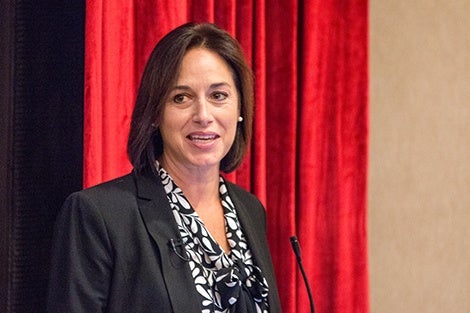December 5, 2017 – It took Hurricane Katrina to convince Karen DeSalvo that health care in New Orleans had to be completely revamped.
DeSalvo, Assistant Secretary of Health at the U.S. Department of Health and Human Services from 2014-17, and health commissioner of New Orleans from 2011-14, told a Harvard T.H. Chan School of Public Health audience on November 29 that difficulties after the storm propelled the city to reshape its health care system to become more community-based and responsive to people’s basic health care needs.
DeSalvo presented the Herbert Sherman Memorial Lecture, in memory of the former Harvard Chan faculty member who brought multidisciplinary and creative solutions to the problem of health care delivery.
Creating primary care clinics
When the Category 5 hurricane slammed into the city in August 2005, catastrophic flooding led to widespread destruction and the death of more than 1,800 people. It also incapacitated the city’s major health care providers, DeSalvo said.
Unable to operate out of flooded hospitals, doctors and nurses set up makeshift clinics in neighborhoods throughout the city. DeSalvo, who at the time was vice dean for community affairs and health policy and professor of medicine at Tulane University School of Medicine, was a leader in building the fledgling system. The clinics wound up providing mostly primary care, handling everyday issues like high blood pressure, coughs, or rashes. DeSalvo said the experience made it clear that rebuilding New Orleans’ health system with an emphasis on serving people near where they lived—and emphasizing basic and preventive care—would improve health.
The makeshift clinics became permanent over time, bolstered by philanthropy and federal funding, and they now provide care for more than 160,000 people in New Orleans, many of whom are low-income and who had lacked sufficient access to health care in the past. “We had great success creating an infrastructure of primary care,” said DeSalvo.
Social determinants of health
But simply providing health care isn’t enough, she added. It’s also important to consider the social determinants of health—such as whether people have enough to eat, or whether they have transportation to get to a hospital or clinic. “If you come to see me in clinic, and I prescribe the insulin dose that’s just right for your diabetes—but you don’t have a house—it doesn’t really matter that much to you in the scheme of things,” DeSalvo said.
DeSalvo said that New Orleans’ experience holds valuable lessons for the nation as a whole. Overall, she thinks health care has improved in the U.S.—it has become more affordable, there’s increasing use of electronic health records, and there’s greater focus on quality of care instead of quantity of care. But with a large chunk of health care costs concentrated among “the sick few”—a population that is medically needy but also has many social needs—more work is needed to address the social determinants of health. “There’s more to health than health care,” DeSalvo said.
– photo: Craig LaPlante
